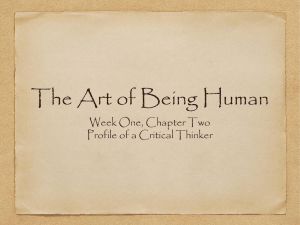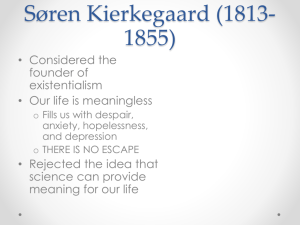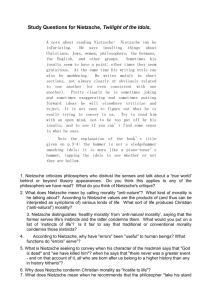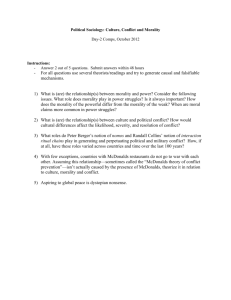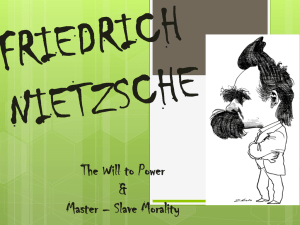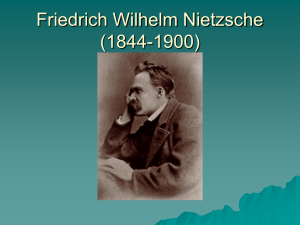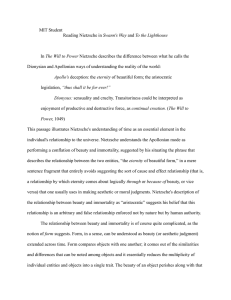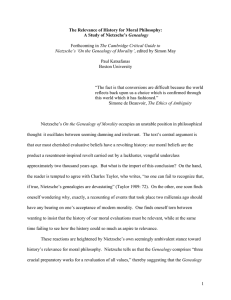What is ethical relativism?
advertisement
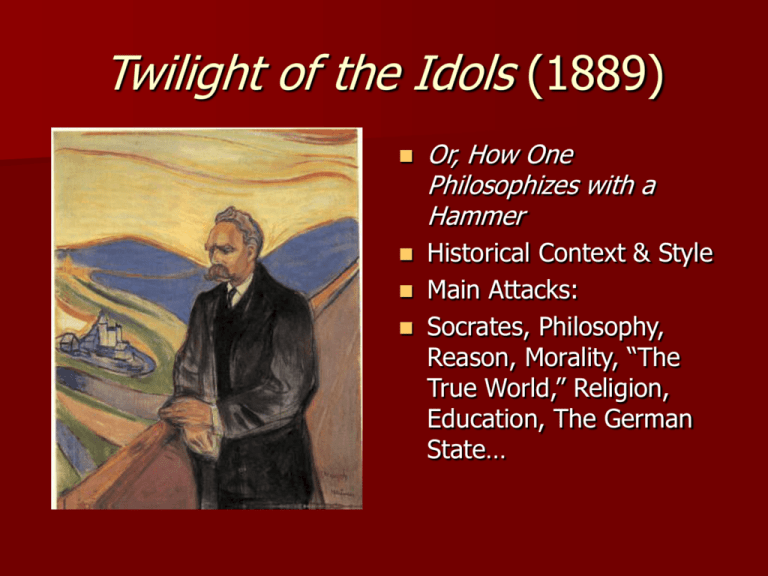
Twilight of the Idols (1889) Or, How One Philosophizes with a Hammer Historical Context & Style Main Attacks: Socrates, Philosophy, Reason, Morality, “The True World,” Religion, Education, The German State… Nietzsche’s Attack on Philosophy What is “The Problem of Socrates”? Decadent, i.e., anti-life, ugly, declining, criminal, pseudo-Greek, anti-Greek “The Socratic equation of reason, virtue, and happiness is opposed to all instincts of the earlier Greeks.” (p. 475) Dialectics replaces noble customs Reason becomes a tyrant and rationality the savior The moralism of Greek philosophers is pathologically conditioned The whole improvement-morality was a misunderstanding in opposition to the instincts (pp. 478-79) When life is ascending, happiness equals instinct Philosophy is a preparation for death The Next Attack: “Reason” in Ф Philosophers lack historical sense and hate becoming E.g., the Eleatics, such as Parmenides (515 BC) and Zeno (490 BC) They maintained a doctrine that reality consisted of indivisible, unchanging being; all is one; thus they denied motion, time, and change Heraclitus (d. 480 BC) is excepted He taught becoming rather than being and is famous for saying “You cannot step in the same river twice.” This world, the only real world we have any sense of, is a world of becoming. To say there is a “true world” of being is an illusion. Any distinction between a “true” and “apparent” world is a sign of decadence, the decline of life. The Dionysian approach: affirm this life and this world and abolish any slanderous talk of the “true world.” (p. 484) Morality as Anti-Nature §1: Moralities have sought to destroy the passions. Any attack on the passions is an attack on life. Such is the hostile practice of the church, which has never thought to ask “How can one spiritualize, beautify, deify a craving?” §2: Moralists who seek to exterminate the passions are too weak to control them. §3: Towards a spiritualization of sensuality (love) and hostility (love of enemies). A renunciation of “peace of soul”? (pp. 488-489) §4: “Every naturalism in morality—that is, every healthy morality—is dominated by an instinct of life.” §6: How naïve and stupid to suggest that one ought to be a certain way. “Reality shows us an enchanting wealth of types.” We immoralists approve and affirm. (p. 491) §5: All value judgments reflect a certain kind of life. What kind of life do your values reflect? The Four Great Errors 1. The error of confusing cause and effect. =religion, morality Revaluation of Values examples: (a) meagre diet and a long life (Cornaro) (b) Virtue and happiness (c) Vice and degeneration (d) illness and weakness 2. The error of a false causality. False picture: inner states-motives-will These are merely surface phenomena of consciousness; we know nothing about true mental causes. 4. The error of free will. A psychological explanation: an excuse for making one dependent on the theologian in order to be judged guilty and punished. ”Christianity is a metaphysics of the hangman.” What can our teaching be? – No one is responsible for humanity. – There is no end or purpose for humanity. – “One is necessary, one is a piece of fatefulness, one belongs to the whole, one is in the whole; there is nothing which could judge, measure, compare, or sentence our being, for that would mean judging, measuring, comparing, or sentencing the whole.” Amor fati (love of fate) The Eternal Recurrence of the Same What the Germans Lack Or, “On Spirit” What has led to cultural decline? – Politics – Christianity – Beer (Oh, no!) (p. 507) – Education: What does Nietzsche have to say about higher education? Is this relevant to you? On Higher Education The goal of education (Bildung) is cultivation, the formation of a human being into a mature, refined, and cultural whole. Educators needed, not scholars or secondary school teachers Towards an Affirmative Perspective The Three Tasks for Educators – Learn to see Be open, suspend judgment First step towards spirituality Learn to think – The craft of logic Learn to speak and write – Too enigmatic – See Zarathustra, pp. 152-153 Skirmishes of an Untimely Man Which did you find the most significant? On Art and Artists Towards a psychology of the artist (sec. 810) L’art pour l’art (sec. 24) Goethe (sec. 49-51) What I Owe the Ancients To the Romans: Style To the Greeks: Dionysus (This is the central metaphor for Nietzsche’s affirmative philosophy.) The Birth of Tragedy Out of the Spirit of Music (1872) Apollo: god of light and dreams Apollonian: well-ordered, rational and serene Dionysus: god fertility and wine Dionysian: wild, frenzied and sensuous Through art life is affirmed as livable. “Art is the truly metaphysical activity of man” and “the existence of the world is justified only as an aesthetic phenomenon.” “The continuous development of art is bound up with the Apollonian and Dionysian duality—just as procreation depends on the duality of the sexes, involving perpetual strife with only periodically intervening reconciliations.” On Dionysus (pp. 560-563)

